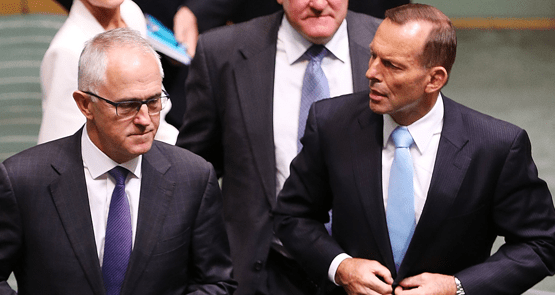
In valiantly attempting to steer the focus back onto Labor this week as the guns issue engulfed it, Malcolm Turnbull hit upon what normally might have been a clever jujitsu. The real threat to gun laws, he said in question time on Wednesday, was Labor, which refused to support mandatory minimum sentences for illegal gun importation. Labor has a “principled opposition” to mandatory sentences, he sneered, when its principle should be protecting Australians.
Not merely was it clever, it played into the theme the government was keen to spend the week dwelling on — Labor’s links with the CFMEU, outlaw motorcycle gangs and other dreadful characters. If Labor had its way, the government wanted to suggest, the country would be awash with illegal gun-toting bikies threatening hard-working sub-contractors on building sites around the country.
[Whisper it softly: is this government any better than Abbott’s?]
Tony Abbott, however, was having none of that nonsense, and went on the ABC’s 7.30 that night to pull the focus firmly back onto the government. A reluctant interviewee of Leigh Sales’ as prime minister, Abbott was happy to take the opportunity to explain that as prime minister he he had been unaware of any deal reached with Senate gun obsessive David Leyonhjelm (who once declared John Howard “deserved to be shot” for his gun laws) for his support in the Senate on a migration bill in exchange for a sunset date on the ban on the importation of lever-action shotguns, blaming any agreement on “a staffer in a minister’s office, no deals from me. No deals from my office. No deal.”
It was also the first interview with Sales in any number of years in which Abbott did not utter “stop the boats”, but that’s by the by.
Unsurprisingly Labor pursued the issue in question time yesterday and didn’t exactly need a parliamentary grilling to extract answers. The two relevant portfolio ministers, Immigration Minister Peter Dutton and Justice Minister Michael Keenan, were asked if Abbott’s version of events was correct. Both contradicted Abbott and said that his office would have been or was kept informed of the deal done with Leyonhjelm. And, in turn, Turnbull completed the takedown. “I have made inquiries of my ministers and can say to the house as a result of those inquiries. I’m satisfied that the minister for justice acted in the full knowledge of the prime minister’s office at that time.”
A furious Abbott rose after question time to claim he had been misrepresented — by Labor, for the sake of formalities, but everyone in the chamber, including Turnbull, who took a seat at the back to watch Abbott’s statement, would have known his target was the Prime Minister. There was no deal, Abbott repeated. But Abbott’s “personal explanation” pointedly mentioned the Lindt cafe siege: for Abbott, this isn’t merely about creating chaos for Turnbull, it’s a reflection on his national security credentials. It doesn’t fit the hard man image, the image of the prime minister who trashed civil rights and threw money at security agencies to fight terrorism, the man who attacked Muslims for failing to talk about the peaceful nature of Islam, to be seen as having connived at a deal to allow high-capacity shotguns into the country.
[If he doesn’t act soon, it’ll be curtains for Turnbull]
(That Abbott actually made Australia less safe by joining yet another Western military venture in the Middle East is also by the by).
Abbott interventions on the issue — first via Twitter, then on the ABC, then in Parliament — entirely derailed the government’s entire agenda for the week, which was centred on the ABCC bill and Labor’s union links. We’ve seen all this before: Kevin Rudd made a point of ensuring Julia Gillard could never get any clear political air to prosecute her agenda or target Tony Abbott. Unlike Rudd, Abbott, at least, engages in his destabilisation in plain view.








Crikey is committed to hosting lively discussions. Help us keep the conversation useful, interesting and welcoming. We aim to publish comments quickly in the interest of promoting robust conversation, but we’re a small team and we deploy filters to protect against legal risk. Occasionally your comment may be held up while we review, but we’re working as fast as we can to keep the conversation rolling.
The Crikey comment section is members-only content. Please subscribe to leave a comment.
The Crikey comment section is members-only content. Please login to leave a comment.